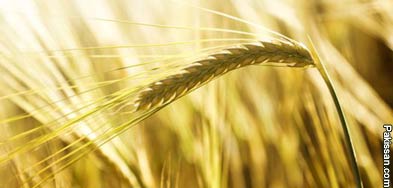|
|
KP’s discount on certified
wheat seed
By Tahir Ali
 The
Khyber Pakhtunkhwa agriculture department has announced a
discount in the prices of certified and basic wheat seeds
for the benefit of the farming community. The
Khyber Pakhtunkhwa agriculture department has announced a
discount in the prices of certified and basic wheat seeds
for the benefit of the farming community.
Officials say the price of certified seeds has been reduced
to Rs1,780 per 50kg from Rs1,850 and that of the basic
variety to Rs1,900 from Rs1,950 last year.
“The discounted standard high-yielding seeds, approved by
the provincial seeds council, will be supplied to farmers on
first come first served basis. Growers have been advised to
use these varieties to get better yields,” an official said.
“Wheat growers should use Pirsabaq-04, Hashim-08, Suren-10,
Ata Habib-10, Sahar-2006, Uqab, Zam, KT-2000, Batoor, Fakhre
Sarhad and Janbaz for irrigated lands and Pir sabaq-04 and
05, Hashim 08, Barsat-10 and Tatara for rain-fed areas in
the province.
“Cultivation of substandard seeds —Shafaq, Bakhar, Abdus
sattar, Bakhtawar-92, KT-2003 and Watan — which have the
least or no resistance against reddish malaise, should be
avoided,” he said.
“These seeds will be available in the model farm services
centres and the offices of district agriculture officers.
Any MFSC could get any amount of seeds it wants to buy from
the official stock,” the official said.
But limited membership and inadequate revolving funds for
buying inputs makes it impossible for the MFSCs to help most
of its members.
Ahmad Saeed, chief planning officer, ministry of
agriculture, says farmers can get seeds on one phone call.
“Farmers are advised not to buy substandard or fake seeds
and report to district officers, field workers of the
department or the Federal Seeds Certification and
Registration Department (FSC&RD) about those dealing in fake
seeds so that action could be taken against them under the
Seeds Act.
“Under the act, those dealing in fake or substandard seeds
are arrested, tried in a court and, if found guilty, are
fined and jailed with their dealership cancelled.
“Any seed which does not have FSC&RD tag with information
about its contents and uses, be it basic or certified, and
is not sealed, is a fake seed. The agriculture department
and the FSC&RD have already cracked down against substandard
seeds and confiscated a large quantity of it from the
market,” he added.
“The provincial requirement of wheat seed is around 80,000
tons. The government provides around 6,000-7,000 tons
through official channels; the rest is supplied by private
sector, while almost 70 per cent of farmers here use their
own stocks.
“The farmers grow wheat on around 0.75 million hectares. Its
acreage has not increased for lack of irrigation water due
to insufficient infrastructure, irregular rains and delayed
cane harvesting,” says Mr Saeed.
“The department needs to replace 10 per cent of common seeds
with basic or certified seeds. It has currently surpassed
that benchmark.
“The department has developed over 6,200 tons of basic and
certified seeds and has supported the private sector to
produce over 7,000 tons of standard seeds. We have brought
down seed prices for the benefit of farmers. We also provide
free seeds, fertiliser and other inputs to registered
progressive growers for their demonstration plots,” he said.
“The flood- and militancy-hit farmers in the province are
also provided free seeds and other inputs by the provincial
disaster management authority and international donors. All
these measures are expected to increase wheat acreage
slightly, if not by a big margin,” he hoped.
When asked why do growers go for substandard or fake seeds,
Abdur Rahim Khan, a farmer leader, says cultivators do so
mainly for two reasons. “Most growers, mainly the poor,
don’t have cash with them. So they buy seeds on deferred
payment which is not the case with certified seeds sale,” he
said.
Khan opined that opening of village or union council-based
farm inputs depots would solve this problem. “But then it
requires huge financial allocation to the agriculture
sector. Currently, the department receives less than two per
cent of the provincial development programme,” he lamented.
At present, more than 500 registered national and five
multinational seed companies are allowed to market seeds.:
Courtesy: DAWN |
|
Pakissan.com;
|